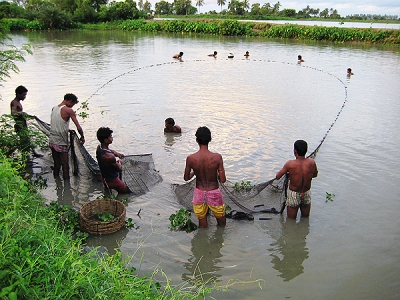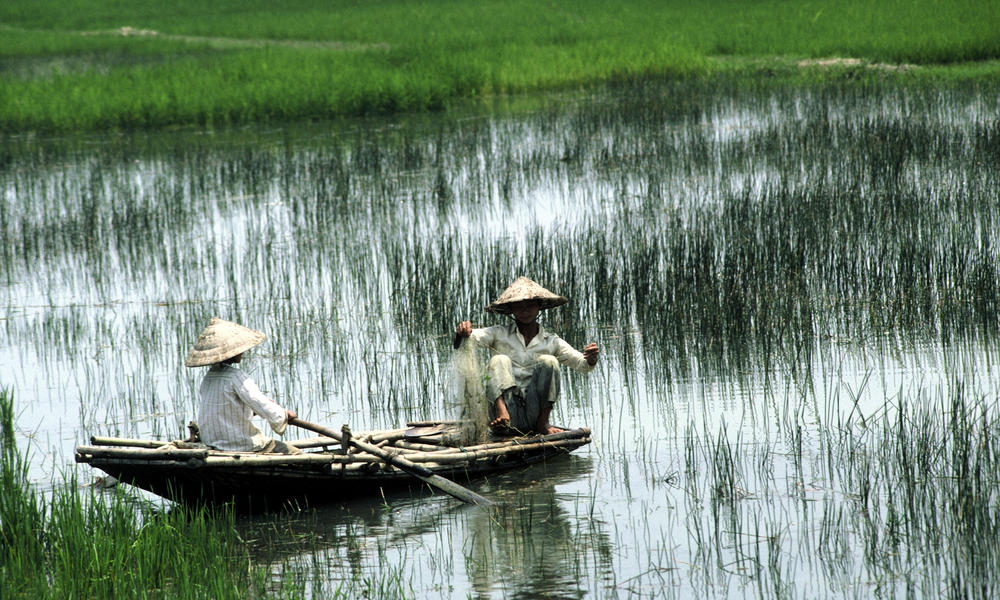Difference between revisions of "Ecosystem Services"
(Published from sandbox) |
(No difference)
|
Latest revision as of 00:28, 16 November 2013

There is growing recognition of the importance of ecological services (benefits arising from the ecological functions of healthy ecosystems) as part of a management strategy in new approaches. Ecological services imply that nature can also play a role in providing safe drinking water. Whether through source water protection or natural filtration, the environment can work in concert with technology to provide water in a reasonable, sustainable fashion.
Water in the ecosystem
From an ecosystem standpoint, water is unique in that it is linked to all four categories of ecosystem services:
- Provisioning services of freshwater systems include the storage and retention of water (in lakes, rivers, and as groundwater) for domestic, agricultural, and industrial use. Water is a vital input for the production of food (e.g., fish, irrigated crops, and livestock), timber, fiber, and fuel. Of course, freshwater itself is a product for consumption.
- Regulating services of freshwater systems and important freshwater habitats such as wetlands include modifying water flows (hydrological flows), recharging and discharging groundwater resources, and diluting or removing pollutants. The ability of freshwater systems to provide these services is strongly linked to the type of vegetation cover and to land cover changes, such as conversion of wetlands or expansion of urban areas.
- Supporting services of the hydrological cycle are important for soil formation and soil loss (erosion) and nutrient cycling. Freshwater systems also provide habitat for a great number of species, promoting biodiversity, which underlies the resilience and productivity of ecosystems.
- Cultural services include the important recreational benefits provided by lakes and rivers, as well as their spiritual and inspirational roles in different cultures.
Wetlands provide many products and services
Wetland ecosystems are often undervalued. Few people realise the range of products derived from freshwater habitats like wetlands: food such as fish, rice and cranberries; medicinal plants; peat for fuel and gardens; poles for building materials; and grasses and reeds for making mats and baskets and thatching houses.
These complex habitats act as giant sponges, soaking up rainfall and slowly releasing it over time. Wetlands are like highly efficient sewage treatment works, absorbing chemicals, filtering pollutants and sediments, breaking down suspended solids and neutralising harmful bacteria.
They are also the most biologically diverse ecosystems on Earth.
Flood control
The most significant social and economic benefit that wetlands provide is flood control. Peatlands and wet grasslands alongside river basins can act like sponges, absorbing rainfall and controlling its flow into streams and rivers.
Clean water
Wetlands act as the Earth's filters, cleaning up water in a number of ways. For example, nitrogen in water is transformed to harmless nitrogen gas, nutrients are taken up by wetland plants in the water. Wetlands remove pollutants such as phosphorous, heavy metals and toxins which are trapped in the sediments of the wetlands. In addition, nitrogen and heavy metals are incorporated into peat during its formation.
Food supply

Rice is the staple diet of nearly 3 billion people - half the world's population. It is grown in wetlands across Asia and west Africa, and in the United States. Almost as important is sago palm, which provides starch from which sago flour is made. And palms from the wetlands of Africa yield valuable oils for cooking and soap making.
However, it is speculated that upwards of half of the world’s wetlands have disappeared since 1900, despite their value to the human population. In some places the pace of wetlands destruction occurs at incredible speeds. In the Philippines, 80% of coastal wetlands have been degraded, drained or destroyed in the last 30 years. Without wetlands, human communities lose many of the vital services that they provide, including water purification, flood control, and food supply.
Shoreline and storm protection
The devastating effects of natural phenomena such as hurricanes, cyclones and tsunamis cannot be denied. Worldwide, an estimated 200 million people who live in low-lying coastal regions are at potential risk from catastrophic flooding.
Cultural value
Throughout history humans have gathered around wetlands and these areas have played an important part in human development and are of significant religious, historical or archeological value to many cultures around the world. For example, on the Coburg Peninsula (the world’s first Ramsar site), traditional Aboriginal owners still conduct an active ceremonial life and undertake semi-traditional hunting and gathering in this coastal wetland.
Materials and Medicines
Wetlands yield fuelwood for cooking, thatch for roofing, fibres for textiles and paper making, and timber for building. Medicines are extracted from their bark, leaves, and fruits, and they also provide tannins and dyes, used extensively in the treatment of leather.
Vital habitat
It has been estimated that freshwater wetlands hold more than 40% of all the world’s species and 12% of all animal species. Individual wetlands can be extremely important in supporting high numbers of endemic species. For example, Lake Tanganyika in Central Africa supports 632 endemic animal species. Wetlands provide a nursery habitat for many commercially important fish species that are harvested outside the wetland. The Varzea Flooded Forest in Brazil is a breeding ground for more than 200 species of fish.
Ecosystem services links
- The Ramsar Convention on Wetlands. Ramsar Convention is an intergovernmental treaty that provides the framework for national action and international cooperation for the conservation and wise use of wetlands and their resources.
- Poverty and Ecosystem Services in East Africa. World Resources Institute.
Acknowledgements
- The Environmental Pillar of Sustainable Water: Ecological Services. Diane Dupont, Ph.D., Professor of Economics, Brock University.
- The value of wetlands. WWF.
- Nature’s Benefits in Kenya: An Atlas of Ecosystems and Human Well-Being. World Resources Institute.
- Threats to Wetlands. WWF.
